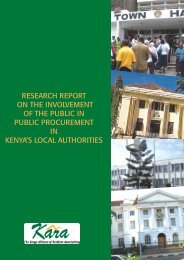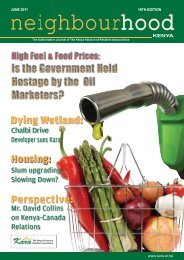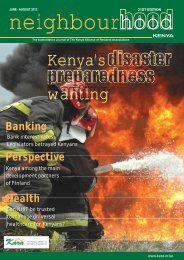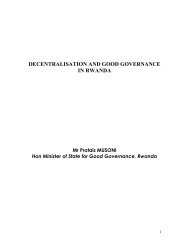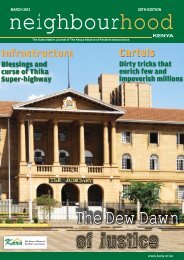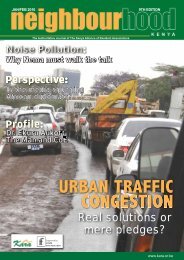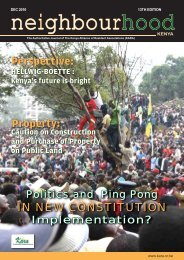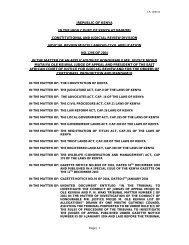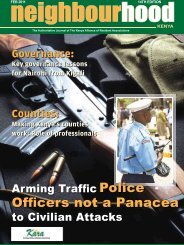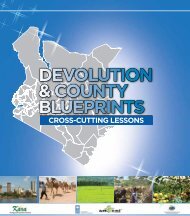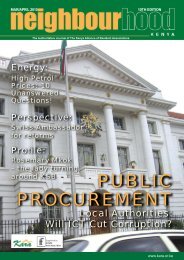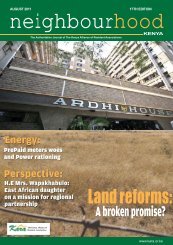Download - "Neighbourhood Kenya 12th Edition" - Kara
Download - "Neighbourhood Kenya 12th Edition" - Kara
Download - "Neighbourhood Kenya 12th Edition" - Kara
- No tags were found...
Create successful ePaper yourself
Turn your PDF publications into a flip-book with our unique Google optimized e-Paper software.
COVER STORYpresent leadership.“The motto of the alliance that “Together, WeWill” has so far been vindicated and I believe<strong>Kara</strong> needs to continue for many more years toinfl uence the management of public affairs. Asit celebrates its tenth anniversary, the Allianceshould not shy away from it set out to do,”Mwenesi says.He adds that the role of <strong>Kara</strong> and othercivil society organizations in the country hasbeen very crucial in ensuring accountability inthe management of public affairs and servicedelivery in the past, from the colonial timesthrough the attainment of independence, the oneparty political system, the return to the multipartysystem in the nineties, to the current times.But it is no time for the alliance to coolits heels yet. More needs to be done. Thepromulgation of the new constitution in Augustis a welcome development, one that <strong>Kara</strong> canproudly claim to have actively participated in itsrealization.Mwenesi contends it is a good document andadvises everyone to get to read and understandit fully in order to gain the full benefi ts.And to this end, he thinks <strong>Kara</strong> has so farplayed a satisfactory role in helping the citizenryunderstand the provisions in the constitutionespecially from the time of its drafting to thereferendum in early August.“The failing of the previous constitution wasthat many people never got to read and knowit. <strong>Kara</strong> has set out to help people understandthe new constitution. <strong>Kara</strong> has been veryactive in organising educational public debatescountrywide to make <strong>Kenya</strong>ns appreciate thenew laws. They (<strong>Kara</strong>) need to step up thedebates,” he notes.Resident associations have a key role toplay in the new constitutional dispensation,according to Mwenesi. The devolvedgovernment structures, for instance, will needthe participation of the people down at thegrassroots and these associations will come inhandy especially in ensuring good governance atthe county level.Residents associations, from which <strong>Kara</strong> isan offshoot, was formed because of there was abreakdown in governance in the late 70s, localauthorities became law unto themselves to anextent that one could not even enforce a courtorder against them.Though things seem to have improvedsubstantially, local authorities are still notparticularly accountable, in fact it is still almostimpossible for one to have them honour adirective from a court of law.<strong>Kara</strong> and other civil society organisations,Mwenesi urges, should stay around tomonitor and push for more transparency and“The new constitutiongives room for <strong>Kara</strong>to play a key role inensuring that membersrealise their rights tothe maximum,”accountability especially at the county level asthe new law is being implemented.“The new constitution gives room for <strong>Kara</strong> toplay a key role in ensuring that members realisetheir rights to the maximum,”Historically, the strongest bonds havealways been with families first andthen amongst communities.Family members are expected to supportand believe in each other.Communities are much the same – theyare expected to work together for the commongood.The arrival of the “settlers” in the first halfof the 20th Century introduced a concept ofclubs and associations into <strong>Kenya</strong>.The clubs were for members to belongto and enjoy the social aspects. Theassociations were to promote their owncommunity interests – mainly to ensure thatbureaucracy was contained and worked in theinterests of the majority.One such association was the Karenand Langata District Association (KLDA),established in the Nairobi suburb of Karen inthe 1930s. This association, together withmany others, flourished until independenceand shortly thereafter.Following independence, there wasperception that the right to challengeThe protection and management of theenvironment is another key area that residentassociations are set out to oversee. <strong>Kara</strong> and itsmember associations have been very active onthis front. The former <strong>Kara</strong> chairman is urgingsuccessive team at <strong>Kara</strong>’s helm not to relent inthis crucial area even as the alliance celebratesits tenth birthday.“The Lake Naivasha Riparian Association(LNRA), one of the founder member associationsof <strong>Kara</strong>, has been fighting for the protection andproper usage of Lake Naivasha which is a sourceof water even for residents of Nairobi. The fightneed to be maintained for the sake of <strong>Kenya</strong>ns,”concludes Mwenesi.Mike Mills: <strong>Kara</strong> FoundingCEO’s remarksMr. Mike Millsbureaucracy (Government) should be anactivity of the past.Many of the associations quietlydisappeared leaving a few, such as the KLDA,to continue under the cautious stewardship ofcommitted community leaders.This was the time in <strong>Kenya</strong>n history inwhich those who should have articulated theinterests of their members, were reluctant tovoice any dissent in public for fear of drawingundue attention to themselves.They were also unwilling, naturally, tojeopardize a privileged lifestyle by riskingbeing considered provocative.With the advent of political change, albeitslow and reluctant, in the early 90s membersof the KLDA, through their communityassociation, began to demand accountabilityfrom the authorities with regard to publicfinances.It was obvious to everyone that the publicservices provided were not commensuratewith the funds (taxes) collected. In Nairobi,the City Council’s performance was abysmaland accountability virtually non-existent.In addition, as everyone was affected bythe poor service delivery, any action takennaturally had the tacit approval of everyone inthe community – and across the city.The KLDA achieved notable success bythe mid to late 90s.The credit for this success lies squarelyon their legal counsel, one Stephen Mwenesiwhose legal expertise created and maintainedthe pressure on the authorities and achievedastounding results. The effectCont. page 8Disclaimer:<strong>Neighbourhood</strong> <strong>Kenya</strong> is produced bi-monthly by The <strong>Kenya</strong> Alliance of Resident Associations (KARA) The opinion expressed in the articles are those of the authors anddo not necessarily reflect KARA’s official position. The editor welcomes contributions of articles and photographs from members of the public. Any materials received willbe treated as unconditionallyassigned for public and will be subject to KARA’s unrestricted right to edit and publish.KARA reserves the right of this publication and no part can be publishedin anyway without express permission.
PERSPECTIVEUS AmbassadorMr. MichaelRanneberger:<strong>Kenya</strong> hasthe bestopportunityto prosper<strong>Kenya</strong> has a very bright future, a future that not only promiseseconomic development but also fundamental political and socialchange, according to the United States’ representative in thecountry.And America is keen to maintain <strong>Kenya</strong> as a key ally and a very highpriority for engagement in Africa, good news for the country. MichaelRanneberger, the US ambassador to <strong>Kenya</strong>, believes that the country hasgreat potential and opportunity to prosper, especially in the wake of thenew constitution.The “most visible envoy” in the country, who was strongly criticized byleaders of the “NO” campaign for the role he played in the run up to thereferendum vote of the new constitution says his main business in <strong>Kenya</strong>is to represent and implement the American policy in the country, a policyhe says is in the best interest of <strong>Kenya</strong>ns.<strong>Kenya</strong>, Ranneberger emphasizes, is America’s friend and as suchdeserves all the support it needs in forging towards good governance andeconomic empowerment, two aspects that the new laws will go a long wayin promoting.“The majority of <strong>Kenya</strong>ns understand what America is doing for<strong>Kenya</strong>; 89 per cent supported the role we played in helping resolve thepost-election crisis. A few either are unaware of what we are doing ormisunderstand,” says President Obama’s point man in <strong>Kenya</strong>.Other than the push for political and legal reforms in the country,Ranneberger says America has been keen to ensure that <strong>Kenya</strong>n youthget informed and participate more in shaping the future of the nation.To that end America has launched a new “Yes, Youth Can” initiative toempower young people by supporting microenterprise activities and by6.
PERSPECTIVEsupporting grass roots youth organizationsto participate in the political process.The man who believes in focusing on thepresent, without becoming too preoccupiedabout the future, Ranneberger advises<strong>Kenya</strong>ns to be alert for those who mightwant to hijack the implementation of thenew constitution and manipulate it to theirown selfish ends.But who is Ranneberger?Ranneberger trained to be a teacher, butinstead joined America’s Foreign Serviceand has served in Latin America, Europe,and Africa. He was Ambassador to Malibefore coming to <strong>Kenya</strong> in 2006.At the time he joined the ForeignService, Ranneberger was pursuing adoctoral degree in history and politicalscience, which he abandoned to takeadvantage of the new opportunity. He saysthe education in history and political sciencehas been an asset in performing diplomaticduties.FamilyRanneberger has two children, 23 year oldMark and 19 year old Elizabeth. The sonis in the private sector in the US while thedaughter is a university student. He has onebrother, Robert, who lives in Baltimore, andhis father lives in the US too.AchievementsAmong the things he considers as hisachievements in <strong>Kenya</strong> are the crucial roleplayed by the U.S. to help resolve the postelectionviolence, especially working withKofi Annan and other mediators to quell theviolence and map the way forward.He is also pleased with the support theU.S. provided on the inclusive constitutionalreview process that resulted in broadsupport for the new constitution and thepromulgation of the new constitution.“Though hard to measure, the supportprovided by theU.S. to <strong>Kenya</strong>nyoung peopleis one of themost importanceachievements,because itempowers themto participatein democraticprocess. I haveengaged withthousands ofgrass root youthsacross the country,holding meetingsand dialogues withthem,” says theenvoy.Describedas a workaholicby some,Rannebergerdenies it, but doesnot deny that heloves his work.“Why shouldanybody pay mefor doing workthat is so muchfun,” Rannebergerquipped.HobbiesBut it is not allwork all the time.Ranneberger says“at home I shut offwork and sleep likea baby, even in themiddle of crises.As a hobbythe tough talkingenvoy likes toread history,current affairs,fi ction, periodicals,magazines and newspapers. His favorite drink: ‘Dawa’, a <strong>Kenya</strong>n Coastal drink.To Ranneberger happiness means good friends and people one can relax andhave candid discussions with, and time spent with family.As a hobby the tough talking envoy loves to readhistory, current affairs, fiction, periodicals, magazinesand newspapers. His Favorite drink: ‘Dawa’, a<strong>Kenya</strong>n Coastal drink.7.
CORRUPTIONHuge expectations as<strong>Kenya</strong>ns welcomePLO at KACC“It’s all achievable my dear friends.All you need is the will and thedetermination. Resting in your laurelsis no business of a great mind!” thosewere the words of Prof. PLO Lumumba,<strong>Kenya</strong>’s latest anti-graft czar when hejoined the popular Facebook social mediaon 28th August 2008.The very words will now come in asa test to the gigantic public expectationsfrom Prof. Lumumba’s tenure as he takesover the most coveted public servicejob, outside the presidency, as directorand chief executive at the <strong>Kenya</strong> Anti-Corruption Commission (KACC).The eloquent PLO, a former secretaryat the defunct Constitution of <strong>Kenya</strong>Review Commission, is known to be anachiever.He has equally almost succeededin discarding the excess baggage of<strong>Kenya</strong>’s divisive and cancerous negativeethnicity – in which case it is not easy to beidentifi ed with a specifi c one.It is expected that he will work withhis new team and specifi cally his deputydirector for investigations Mr. John Mutonyi,who has been acting as director, to heavilycut down on down on major corruption.Even as he takes his new offi ce, itwill help matters if he can cultivate morecooperation and support from the revampedand highly rated Attorney General’s offi ce.The new director will need to addressthe challenges of capacity – in terms ofrecruiting more technical staff to addressthe backlog and ensure that investigationsand recommendation for prosecutions takethe shortest time possible.Preventive policing of corruption will beequally important just as much as regularpublic reporting would be.At <strong>Kara</strong>, our expectations are that thenew director will make a date with thewater sector where corruption is rife. Hepossibly should make inroads into the localauthorities, education, health, roads andother areas.Mike Mills: <strong>Kara</strong> founding CEO’sremarksFrom Page 4of these results galvanized the formationof many other community organizationswishing to emulate the KLDA model.The time was right to coordinate thisswell of interest. The KLDA committeeagreed to call together interested, establishedorganizations. The inaugural meetingwas held early in September 2000 anda framework established for an umbrellaorganization that became known as the <strong>Kara</strong>.<strong>Kara</strong>’s role was to encourage the formation ofresidential associations that would speak fortheir interests, on behalf of their members –under the tutelage and support of <strong>Kara</strong>.It was diffi cult at the beginning – alittle like trying to herd cats! However, theteething problems were overcome as foundermembers worked together to resolve theissues.The advent of Mr. Stephen Mutoro asChief Executive enabled <strong>Kara</strong> to becomea much more professional body and, inconjunction with its effective secretariat,<strong>Kara</strong> has achieved its role as therespected umbrella body for the mushroomingresidential associations who support theinterests of their civil society communities.So, now that <strong>Kara</strong> is established, what ofthe future?<strong>Kenya</strong> faces a new dawn with, finally,the new constitution in place. This isa magnifi cent achievement and bodeswell – just so long as the post referendumeuphoria (remember the 2002 election resulteuphoria?) is not transferred to the newconstitution! Following the 2002 election most<strong>Kenya</strong>ns buried their heads in the sand andbelieved that everything would be ok.They naively forgot that nothing worksout the way they want it to unless they areprepared to put in the work, a lot of work, tomake it work. The citizens and supporters of<strong>Kenya</strong> must now roll up their sleeves and getdown to work!As we move ahead, I see <strong>Kara</strong>’s roleas representing civil society’s interests (theinterest of every <strong>Kenya</strong>n) in developing a“living” constitution that effectively addressesthe aspirations of ALL <strong>Kenya</strong>ns. <strong>Kara</strong> mustbe vigilant. Old habits die hard. <strong>Kara</strong> mustexamine every move of the bodies chargedwith the transition of <strong>Kenya</strong> into the future –and represent the interests of its members(and <strong>Kenya</strong>ns as a whole) to ensure that civilsociety assumes its rightful place as a partnerin the development of <strong>Kenya</strong>’s future. <strong>Kara</strong>can do it.“If you think you can or think you can’t,you’re right” Henry Ford.8.
KARA CHAPTERSEmbu Citywide Residents Association hitthe ground running.Since its formation last year Embu Citywide Residents Association has been actively involved in various initiatives aimed at creatingawareness regarding its existence and service delivery issues. Apart from membership recruitment drive, the association wasinvolved in carrying out civic education on the proposed new constitution just before the just concluded referendum.Members of the association organized a meeting with fi ve District Commissioners of Embu West, North, and East, Mbeere Eastand South to establish an enabling working relationship. A separate meeting was held with the Mayor of Embu Municipal Council todiscuss service delivery challenges and develop structure means of engagement.Nyeri Citywide Residents Associations Wins Supportof Central Province ResidentsIn its short period of existence, NyeriCitywide Residents Association boastsof over 40 paid up members who areactively involved in various activities. Theofficials of the association have madeinroads into the populous province byvisiting various districts and governmentofficials to enhance partnerships.In a recent meeting with the traffi cbase commander and Nyeri MunicipalCouncil officials, members of theassociation pointed out the risks pedestrians face as a result of motorists failing to observezebra crossings.The offi cials also appealed to the Town Clerk to ensure that public service vehicles haveclearly designated stage to drop and collect passengers. Other areas of discussion with thecouncil included the redesigning and construction of Kamkunji stadium which is in a badstate.In a bid to create awareness about the association, the officials have visited several districtsincluding Githunguri, Lari, Kikuyu, Kirinyaga, Thika East and West, Greater Nyandarua andGreater Nyeri. The association has received support from the Central Province residentsand government offi cials who are ready to work with them to improve service deliverystandards.Nakuru Citywide Residents Association engagesin Public Private PartnershipsNakuru Citywide ResidentsAssociation was formed in August2009 as a chapter of The <strong>Kenya</strong> Alliance ofResidents Association (KARA) for the RiftValley region. The associations’ primaryaim is to provide quality public information,awareness and advice to consumers andtax payers.The Association enjoys a tremendouscultural and geographical diversity whichmakes it a powerful local and regionaladvocate for universal principles suchas the intrinsic dignity for sanitizedliving environment, the fundamentalimportance of good governance througheffective leadership and the importance ofresidents’ involvement in community drivendevelopment.The Association strives to offerinformation and news by conductingobjective research, investigations, analysisand capacity building in order to contributeto the achievement and realization ofnational development goals. This goal ismet through effective dissemination ofnews resulting from informed analysisand by continued involvement of resourcepersons through their writter, forums onvarious issues such as corruption, gender,economic development, environmentbusiness, health, sports, leadership andgovernance among others which hindergrowth in the society.The Residents Association serves asa centralized source of information andenlightenment in the region from whichall the residents and private sector mayobtain information and advice on issuestouching on Local Authorities, Housing,Trade, Agriculture, Politics, Health,Environment, Sports, and InformationTechnology among others.ACHIEVEMENTSSince the establishment of NCRA, inAugust 2009, a lot has been achievedin realising effective service delivery toresidents and NCRA believes there ismore to be done.Some of the achievements madeinclude;• Highlighted the plight of the poorpatients at Rift Valley Provincial GeneralHospital through local media houses whichdevelopment forced the Government toact on the status of the institution. Theresidents of Nakuru are now able toaccess timely quality medical attention atthe facility.• As a member of the Central RiftBusiness Agenda (CRBA), NCRA hasbeen involved in roundtable discussionswith government offi cials drawn from localauthorities, Provincial Administration,Trade and Industry and pushed forreduction of Land rates, additional supplyof Water Services to the residents,increased vigilance in security, pushedfor scrapping of unnecessary licensesand managed to repossess 43 acres ofgrabbed public land that included thetown’s Water Supply, Land and CouncilHouses that had been irregularly allocatedand sold. NCRA also managed torepossess grabbed slaughter house landthat had been grabbed.• Partnered with the Committee ofExperts on the constitution to carry outcivic education among other feats.10.
REGIONALprofessional qualifications of the citizens ofthe region.• Encourage integration of East AfricanCommunities: Any citizen from a PartnerState shall have a right of residence inanother partner State for purposes of carryingout a particular economic activity.• Creation of large border-free singlemarket: with the coming into force of theEAC Common Market Protocol on 1st July2010 and it subsequent implementationwhich is already underway, businesses willimmediately have an expanded market of126.6 million people with a GDP of aboutUS$73 billion.• Facilitate access to cheaper and highquality goods: A citizen of one Partner Statecan shop in another Partner State wheregoods are cheaper without restrictions oradditional taxes. The goods will have to beoriginating from the EAC region. Competitionintroduced by the single market will drivequality of goods and services up and pricesdown.• Encourage protection of the environment:Article 40 of the Common market protocolwill promote sustainable management of theenvironment.• Promote fait trade: Part H of the CommonMarket Protocol will help in checkingrestrictive trade practices that might hinderfree trade. Some of the provisions that willhelp check restrictive trade practices include:Article 36 on Consumer Protection and Article43 on Co-operation on Intellectual PropertyRights.• Facilitate Research and Development:The EAC Common market protocol proposesto establish a Research and TechnologicalDevelopment Fund to support researchinitiatives. This will encourage innovation andgrowth.Q. With the new constitution inplace what opportunities and challengesexists for the Ministry? How will the newconstitution affect the realization of thegoals of the Ministry?The Ministry’s Vision is: “to have a deepenedand widened East African integration forimproved livelihoods and sustainabledevelopment of <strong>Kenya</strong>” while the missionis (i) “to facilitate, coordinate and overseethe development, monitoring and evaluationof the implementation of EAC policies,programmes and projects for effectiveintegration; and (ii) ‘to promote partnerships,liaisons and maintain linkages with allstakeholders on EAC matters for maximumbenefi ts.” The new Constitution does notin any way negate the achievement of theVision and mission of the Ministry. In keepingwith the vision of a widened and deepenedEast African Community, the new Constitutionprovides an enabling environment thatpromotes opportunities to explore newbusinesses and trade and new employment.This will be good for both for <strong>Kenya</strong>ns, inparticular, but also East Africans in general.The new Constitution also promises politicalstability which is envisioned under theCountry’s blueprint for achieving sustainabledevelopment and prosperity, the Vision 2030.It is important to also take note that theVision 2030 is equally dependent on regionalpolitical stability, rapid socio-economicprogress of the East African Community andthe wider region.In considering the second phase of theEAC integration process, one needs to payattention to the new Constitution under theFifth Schedule which requires enactmentof legislations to be made by Parliament aspart of the implementation process. Some ofthese envisaged legislations/amendments tothe existing laws will have a bearing on theEAC Common Market Protocol, especiallywith respect to free movement of persons(Articles 13, 15 and 16), free movement oflabour (Article 41), right of establishment andresidence (Articles 39) access to and use ofland and premises (Chapter 5 and part 8 ofthe Sixth Schedule). But it is worth noting thatboth the new Constitution and the CommonMarket Protocol require amendments tothe existing legislation or enactment of newlegislation where they do not existFor instance in <strong>Kenya</strong>, the ImmigrationAct, Alien Registration Act, Income Tax Act,Companies Act, Land Act, and Land TitleRegistration Act, which affects citizenry withregard to the four freedoms and rights underthe Protocol will be amended in response toboth the EAC Common Market Protocol andthe new Constitution in order for the citizenryto enjoy their freedoms and rights.The challenges we envisage as a Ministry areon (i) the capacity of our National Parliamentsto enact the enabling legislation in time forspeedier implementation of both the protocoland the new Constitution and (ii) harmonisingthe provisions of the new Constitution and theCommon Market Protocol, including definitionof terms, e.g., “person” under the Protocoland “citizen” under the new Constitution inorder to avoid the potential for discriminationin allowing the EAC citizens to reside in<strong>Kenya</strong> under the new Constitution.Q. What in your view should be therole of resident associations in service12.delivery processes? How does yourMinistry relate with and involve residentassociations in its planning and servicedelivery?The EAC Common Market Protocolprovides for free movement of goods, freemovement of persons, free movement oflabour, free movement of services, and freemovement of capita. It equally provides forthe right of establishment where the EACcitizens will have the right to establish theirbusiness in any Partner State and pursueeconomic activities and the right of residence.The EAC citizens will be guaranteed thesefreedoms and rights. Because the ResidentAssociations in their nature of representingthe voice and action of residents onconsumers and taxpayers’ rights with a viewto accelerating access to public servicedelivery of necessity have a role to play in theEAC integration processThis is more so with regard to ensuringthat the EAC Partner States uphold the rightsand freedoms provided for in the Protocol.<strong>Kara</strong> is already doing this with <strong>Kenya</strong>’s localauthorities and should network and reach outto similar associations across the bordersin order to upscale this important conceptacross the EAC region as delivery of thelocal authorities has potential for the fosteringeconomic growth and regional re-constructionin terms of improved service delivery to theresidents of East Africa within their respectivejurisdictions.Q. <strong>Kara</strong> is celebrating its 10thAnniversary this year. In your view, doyou think the Alliance has lived to itsmandate? What are some of the areas thatneed improvement if any?Advocacy on consumers’ and taxpayers’rights with respect to access to public serviceand effi ciency in delivery is inexhaustible.I am aware that KARA has been doinga good job in many areas, for example,with local authorities and a lot more stillneeds to be done. This requires a lot ofpartnerships involving across section of otherstakeholders. With the new Constitutiondevolving more funds to the local levelsthrough the proposed County Governmentsand the collapse of borders with the comingof the EAC Common Market, there isalready need for more vigilance on howthe devolved funds (in <strong>Kenya</strong>) will be usedand also ensuring that the rights of the EACCitizens are upheld as provided for underthe Constitution (<strong>Kenya</strong>) and Protocol (EastAfricans). The role for KARA is already cutout.
INDUSTRIALIZATION“Forget Agriculture, embracemanufacturing”Dr Engineer <strong>Kara</strong>nja Kibicho, the chiefaccounting officer at <strong>Kenya</strong>’s ministryof IndustrializationThere is fresh blood in the Ministry of Industrialization. And with it fresh hope ofrealizing the ever elusive vision of the Vision 2030, the dream that is supposedto catapult <strong>Kenya</strong> closer to the fi rst world and hopefully save the country from thedevastating poverty that defines the majority of <strong>Kenya</strong>ns lives.For the majority of <strong>Kenya</strong>ns, Vision 2030 has always been some theory on paper highup in the government bureaucracy. And that the Ministry of Industrialization has all alongbeen mum has not helped matters putting in mind that the vision revolves more or lessaround making the country industrialized by the year in question, just two decades away.But now there seems to be some real light at the end of this otherwise dark tunnel.Dr. Eng. <strong>Kara</strong>nja Kibicho, the chief accounting offi cer at <strong>Kenya</strong>’s Ministry ofIndustrialization is promising fi rst, fast change over in the manner of conducting businessat the Ministry and second but most importantly hastening and exhibiting progress towardsrealizing the dream.The new Permanent Secretary (PS) is obviously on the right track. He has begun hisassignment by identifying what ails his Ministry’s mandate before attempting to address theissues.In an interview with <strong>Neighbourhood</strong> <strong>Kenya</strong> in mid August Dr. Eng. Kibicho revealed whatis not obvious to most <strong>Kenya</strong>ns, that local manufacturing industry has had a tremendousgrowth over the last ten years, but unfortunately, growth in the negative.“Industry growth in the country hasover the years been negative. So manymanufacturing industries have closed downand very few have come up. There hasbeen too much importing (into the country)and very little exporting,” says the 42 yearold, just three months into the civil servicefrom the academic world that is JKUAT.The engineer illustrates the point furtherby giving an example, East Africa Foundry,which he says in not many years ago wasemploying over 2000 people but which,owing to unfair competition coming fromforeign fi rms is fi nding it so diffi cult to dobusiness and can only afford to hire slightlyover 200.According the industry’s top servantwhat needs to be done and done fast isto transform the good intentions into real14.
INDUSTRIALIZATIONworkable policies with clearly defi nedstructures and time frame.And he has begun to do just that byrecalling a policy paper earlier submitted tocabinet for consideration to his Ministry.He now wants to re-evaluate it, consultall possible stakeholders and make specificchanges before taking it back to the cabinet.This, he believes, will make the paper haveclear policies and interventions neededto push the Ministry and country at largeforward.“We are looking at the paper so that wecome up with an Industrialization Policythat avoids mere talk, and we are doing itsimultaneously with other ministries,”saysthe mechanical engineer who just resignedas chair of the mechanical engineeringdepartment at the Jomo <strong>Kenya</strong>tta Universityof Agriculture and Technology (JKUAT).The PS says the decision to recall thepolicy paper was motivated by the need togive “clear answers” to specifi c problems.“We do not want a policy paper thatlooks like a Geography text book whichgives similar explanations and prescriptionsfor all regions without regard to specifi ccircumstances,”Dr Kibicho arguesadding that though consultations with allstakeholders within and outside the Ministryhave since been done and the paper was,at the time of the interview, undergoingredrafting.And the academic public servant,steaming with energy, thinks theenvironment has never been better to putin what <strong>Kenya</strong> has ever hoped for in place,what with a new and better constitutionalorder here with us and a clear political willemerging.“If you look and listen to what thepresident (Mwai Kibaki) and Prime Minister(Raila Odinga) are saying and doingacross the country you will understandthat the environment is right,” he told<strong>Neighbourhood</strong> <strong>Kenya</strong>.But the engineer seems keen to changethe thinking of the status quo. First hedoes not believe that our obsession withAgriculture will deliver us to the “promisedland”. And the NGOish emphasis on smalland medium scale enterprises (SMEs) canonly get us small and at best medium.“SMEs are begging words used toattract funding from the World Bank andother donors. The best they achieve is getsome funding for nails and hammers. Veryfew people can become millionaires byusing nails and hammers. We need to focuson big manufacturing industries if we hopeto grow rich like the fi rst world countries wewant to match,”On Agriculture he had a classic exampleto give!“If one were to use space the sizeof this offi ce(his offi ce on the eleventhfl oor of Teleposta Towers) to manufacturecell phones, one would be sure of makingmillions. If on the other hand they choseto plant maize on the space you know thehighest profi t they can make,”Dr Kibicho says there is need to provokeand direct the thinking of all <strong>Kenya</strong>n policymakers towards manufacturing as a meansof becoming fi rst world.But the Ministry is not dismissingAgriculture entirely though. Kibicho thinksagriculture is important as a source of foodbut is not the best route to follow whenpursuing world status economy.“Ideally we should identify fertile areasin the country and concentrate on producingfood enough to feed us in the country andthen in arid and semi arid areas set uplarge manufacturing plants to drive theeconomy,”he says adding “We need tonote the basic concepts like ConstituencyIndustrial Development Centres and buildon them,”No country, the engineer believes, hasever achieved the First World status byrelying entirely on agriculture and <strong>Kenya</strong>can certainly not afford to reinvent thewheel.And just how soon do we expect tosee the results from this charismatic PS?First the redrafted Industrialization policyis expected back to Cabinet by end ofOctober, then in his own words, we shouldwatch this space!We at <strong>Neighbourhood</strong> <strong>Kenya</strong> wish thePS the best in his endeavours.notice boardTogether We Will03 SeptKEWASNET Learning Visit Meeting13 SeptDecentralization and GovernanceNSA Network meeting21 Sept<strong>Kara</strong> 10th anniversary 5,000tree- planting at Karura Forest22 Sep<strong>Kara</strong> 10th anniversary luncheon- 12pm - 2pm22 Sept<strong>Kara</strong> 10th anniversary - BungeFC vs <strong>Kara</strong> FC -Nyayo Stadium (4pm)The <strong>Kenya</strong> Allianceof Resident AssociationsKabarnet Lane , off Kabarnet Road,Off Ngong Road,P.O Box 1411-00100Nairobi, <strong>Kenya</strong>E-mail: info@kara.or.keTelephone: 254-20-3874331,3873828, 2341515Mobile Phone Number:0725983445; 0772700007; 0733779585http://www.kara.or.ke15.
insuranceWhy Insurance SectorService Delivery is Low<strong>Kenya</strong>’s insurance sector is ahuge contributor to the nationaleconomy.Governed by the Insurance Act andregulated by the Insurance RegulatoryAuthority (IRA), the sector hasnonetheless been in the news mostlyfor unpleasant reasons.This was especially so prior toIRA becoming a reality. Previously,the Commissioner of Insurance wasa small department at the Ministryof Finance. Even after IRA came tobe, policy holders complaints havepersisted.One insurer recently bought severalpages in two leading dailies to put upa case against a long list of claims.The Matatu Welfare Association readmischief in what it feared as use ofcourts to either delay or avoid settlingclaims.There are over 50 insurancecompanies and 2 locally incorporatedreinsurance companies licensed tooperate in the country. Of the licensedinsurance companies, general insurersare the majority, with few long terminsurers and composite (both life andgeneral) insurers.Over 200 firms have been licensedas brokers together with an estimated20 medical insurance providers. Closeto 3,000 insurance agents, 30 lossadjusters, 1 claims settling agent, 8risk managers, 250 loss assessors/investigators and 10 risk managershave been licensed.Sector analysts say that insurancecompanies generally report high lossratios of between 50% and 60%. Whilefalsified claims are blamed, sectorineffi ciency and minimal transparencycould account for most of such losses.Experts also say that insurershave traditionally relied on investmentincome to act as a cushion for theirunderwriting results. This impliesthat service providers with minimalinvestments risk their solvency.Reform of the insurance sector hasbeen slow to come. It has not beenall gloomy though. Some of the newproposals within the sector to rewardaccident-free motorists with lessand attractive annual premiums asSector analystssay that insurancecompanies generallyreport high loss ratiosof between 50% and60%. While falsifiedclaims are blamed,sector inefficiency andminimal transparencycould account for mostof such losses.compared to bad ones are welcome.The overall sector reform has,however, been slow on the claimsprocess. IRA has done so little onpublic education of their rights save fora few select open days in a few towns.Industry service standards on averagehave remained low.The industry welfare association,Association of <strong>Kenya</strong> Insurers (AKI),has been keen to address issues oftariffs and rights of its members. Aswould be expected, AKI has not beenaddressing policyholder challengesapart from road safety issues.Again, the IRA as regulator hasbeen overly lenient with some of thelicensed insurers whose solvencycould be in question, this despite thefact that Central Bank Governor Prof.Njuguna Ndung’u and an alternate ofthe Finance Permanent Secretary siton the IRA board.IRA’s job, according to theInsurance Act, is to formulate generalinsurance policies and guidelines;license insurers and intermediaries;formulate and enforce insurancestandards especially in regard to thecompulsory insurance covers like thirdparty motor vehicle insurance; approvetariffs and rates of insurance andhandle complaints from policyholdersand the general public.Other IRA functions are monitoringthe performance and fi nancial viabilityof insurance companies; collectinginsurance license fees and otherrelated taxes; preparing annualperformance reports of membersof the industry and monitoring andenforcement of claims settlement.In the face of these functions, theIRA though in its formative stages, haslittle to show for the general public.It is from this that <strong>Neighbourhood</strong><strong>Kenya</strong> requested for public experiences(pleasant and unpleasant ones) oninsurance. See page 21 for results.Over 200 firms have been licensed as brokers together with anestimated 20 medical insurance providers. Close to 3,000 insuranceagents, 30 loss adjusters, 1 claims settling agent, 8 risk managers, 250loss assessors/investigators and 10 risk managers have been licensed.16.
ON THE XXXXXXXX MOVE PROFILEDr. Macharia takes overfrom Mwinzi at Nema:National Environment ManagementAuthority (Nema) has a new actingdirector general. Dr. Ayub Macharia,formerly director of public education, tookover the reins of leadership as acting directorgeneral.The Nema board development dealta blow to the outgoing director general Dr.Muusya Mwinzi’s hopes of a further 4-yearcontract.According to the EnvironmentalManagement and Coordination Act, theposition can only be fi lled by the Presidentwho is at liberty to still recall and hand alifeline to Dr. Mwinzi.This is not withstanding the AttorneyGeneral’s indecisiveness on the <strong>Kenya</strong> Anti-Corruption Commission fi le on the formerNema boss.Nema has been in the news sincelast year over allegations of governance challengesas captured in the yet to be implemented Effi ciencyMonitoring Unit (EMU) and the various Auditor General’sreports on Nema.<strong>Kara</strong> CEO Mr. Stephen Mutoro welcomed the newdevelopment saying, “we hope that the new managementwill renew our memorandum of understanding withus, review contentious EIA’s, enhance staff moraleand above all move to restore publicconfidence in Nema.”“They will have our undividedsupport should they take the pathof reforming the institution andrepairing its dented public image”,he added.Since inception, Nema has hadthree director general namely Amb.Prof. Michael Koech, Prof.Ratemo Michieka, and Dr.Muusya Mwinzi. Prof.Koech teachesat <strong>Kenya</strong>ttaUniversityNema acting Director GeneralDr. Ayub Macharia,Outgoing director generalDr. Muusya MwinziThe “stop uncontrolleddevelopments” fund set upAs <strong>Kenya</strong>n residents remain keenon orderly, serene and peacefulneighbourhoods, <strong>Kara</strong> has askedvarious affected residents associationsto re-strategize and build their collectiveresource capacity to tackle the rampantproblem of uncontrolled developments inNairobi, Mombasa, Nakuru, Kisumu, Eldoretand other parts of the country.The increased questionable approvalsof uncontrolled developments particularly inNairobi and other major parts of the countryremain a real threat to <strong>Kenya</strong>’s environmentand water resources.At the neighbourhood level, and withthe urban population explosion taking itstoll, the situation is fast turning the onceleafy areas into densely-settled unsightlyconcrete jungles that would combineto heavily suffocate the competition forlimited and the shrinking utility servicesinfrastructure.This is the reason Thika, Athi River,Kitengela, Kiambu and Ngong on theoutskirts of Nairobi are in very high demand.The Karen, Runda, Lavington, Loresho,Buruburu, South B, Nyali and other estatespeople knew a few years ago are not thesame. They are deteriorating by each day.The fast shift from residential to commercialand/or mixed commercial and residentialparadigm is worrying. The inaction on thepart of City Council of Nairobi’s planningdepartment; National EnvironmentManagement Authority (Nema); WaterResources Management Authority and17.other development control bodies is causeenough for alarm.Luckily, <strong>Kenya</strong> has a new constitutionthat empowers ordinary citizens throughCounty Governments and of course theproposed Nairobi Metropolis. Regrettably,the new laws may only deal with the futurechallenges.For now, we have to sacrifi ce and takeup this particular cases as they come. InNairobi, the Lavington Chalbi Drive andLower Kabete Road developments andmany others will serve as case studies.It is the reason we are urging you, yourfamily, friends and neighbours to support theStop Uncontrolled Developments Fund.Contribute today and make a difference...
City By-lawsTribulations in the handsof City Council Askaris<strong>Neighbourhood</strong> <strong>Kenya</strong> put togethercollections of city residents’comments on various blogs asregards the city council of Nairobi by-lawsenforcement.“It seems like these laws are inventedwhimsically as the chaps move along. It isinteresting that you cannot easily get yourhands on the by-laws of the City council. Iwas informed by a learned friend that whenhe went to ask for a copy of the by-laws, hewas informed that these are not availableanywhere on soft copy, not even their website(I’ve checked). Apparently, he was told theseare only available on hard copy and you payfor each page that you need a copy of, whichthey make for you a page at a time. Youcannot get a copy of the whole thing. So whoexactly is supposed to know when they arebreaking the by-laws or not?“I may not be exactly the sharpest crayonin the box when it comes to legal matters, butI imagine that it would not be too much to askif these by-laws were available for the publicso that we may know what to do and what notto do. I guess that common sense is notso common after all. The absence ofthis may indicate that laws are beingthought out without followingthe due process. When willmembers of the publicbe given thechance tobe votingfor the city mayor? The buck must stopsomewhere surely!!”“In January, I was arrested by citycouncil askaris for leaning on a street lightat Tusker (Mfangano Street-Ronald NgalaRoad junction). These askaris are not lawenforcers. They are extortion gangs. Themodus operandi of the askaris is a clearsign of <strong>Kenya</strong>’s failing state status.”“These City Council askaris arebecoming too much. Rather than focusingon crooks who steal sidemirrors and lightsfrom cars, they now target innocent citizensto make a quick buck. I wonder whatprocess Nairobi residents can follow to stopthis madness.“Maybe you’ve been caught on thewrong side of the City Council by-lawsor haven’t yet. If you are one of thoseones who haven’t, let me sharemy experience at thehands of citycouncil askaris. I was unsuspectingly buyingmyself a stick of gum, when I was nabbedby the askaris.“It took me a few minutes to wrap myhead around what was happening. I wasquickly informed that it was a crime topurchase goods from a hawker, and afterlying through my teeth in a bid to convincethem to let me go, I was berated for beingignorant and immediately marched to a citycouncil vehicle that was parked nearby.“The last time I checked the hawkerwho had sold me gum was right behind me,accompanied by another askari but to mysurprise, I was the only one who got into thepick up! I guess City Council is synonymousto Kitu Kidogo (bribe) because everyonewho gave them some cash was let go in18.
city by-lawsthe course of our journey around the citycenter, as we looked for other ‘unfortunate’<strong>Kenya</strong>ns.“After the final lap, wewere taken to the CityCouncil Offices at City Hall,where the magistrate brisklygave out sentences forsuch misdemeanors; I wasshocked to be fined Sh2,000for buying a stick of gum, whilehawkers were getting away with aday’s work at the Council offi ces, ora bribe of 500 bob.“So there it is… bribery in this caseis cheaper than justice. Truth is withthe new by-laws (cash cows) that havebeen put in place, there are bound to bemany victims of ignorance. Needless tosay, I was late for work but learned a veryvaluable lesson, CCN is always watching!“Here below is a list of the 10 petty offencesthat I witnessed being charged in theNairobi City Court as I waited for my turn.Beware: The City’s deadliest sins:1. Buying from hawkers2. Sitting on a flower pot in the CBD3. Spitting on any footpath or blowingthe nose aimlessly other than into a suitablecloth or tissue4. Taking or alighting from a matatufrom a non-designated area5. Crossing the road while you are onthe phone6. Making any kind of noise on thestreets7. Playing any game, riding or driving orpropelling on a foot path8. Graffi ti9. Owner of a burning building shouldpay for fi refi ghting services whetherthe owner requested for attendanceor not.10. Loitering, importuning or attemptingto procure a female/male forprostitution purposes.11. Having you car with a ‘FOR SALE’sign and haven’t paid the council isalso punishable.“The City’s survival tips!”1. The moment you get into thecouncil courts and charged, please pleadguilty because only then, will you beallowed to pay a fi ne of a maximum ofSh2000. If you deny the charges youmay be detained for two days with nofi ne.2. Do not argue with the Councilaskaris if you know that you are guilty ascharged. You might just double your fi ne.3. Bribes are unacceptable after/immediately the lorry has entered theCity Council’s compound.4. M-PESA is not allowed to pay for acrime.5. Someone else must pay your fi ne.You cannot pay the fi ne yourself after youhave been charged. “<strong>Neighbourhood</strong> <strong>Kenya</strong> welcomes commentsto: research@kara.or.keSpecial thanks goes to our Partners below for theirgenerous support towards the anniversary activities.19.
CONSTITUTIONRanneberger:My actions reflectthe policy of theUS Government.In an exclusive interview with<strong>Neighbourhood</strong> <strong>Kenya</strong> anniversaryedition, US ambassador in NairobiMr. Michael Ranneberger touched on anumber of topical issues. The interviewwas conducted before the Referendum.Here are the excerpts;Q. Thank you for standing with<strong>Kenya</strong>ns during the post electionviolence. In the manner we are goingabout the constitution referendumcampaigns with talk of hate leaflets andpotential for fresh clashes – in youropinion do you think <strong>Kenya</strong>ns learntsufficient lessons from the PEV?A. From my conversations with<strong>Kenya</strong>ns throughout the country, I believethat most people have learned the lessonsfrom the post-election violence. It isessential, however, never to forget whathappened, but rather to remember and toremain focused on how to prevent suchviolence in the future. This is one veryimportant reason why the constitutionalreview process is so important. As VicePresident Biden said, putting in placea new constitution will help ensure thefuture democratic stability and prosperityof <strong>Kenya</strong>. The new constitution will putin place a framework to end the cultureof impunity, to counter negative ethnicityby providing for equitable sharing ofresources, and to reduce poverty. Theseare the factors which have fuelled violence.Q. You have vehemently deniedthat President Obama’s government isfunding the “Yes” campaigns. Are theclaims by your Congressman to thecontrary false? And if yes, what is yourevidence against his claims?A. The U.S. is supporting theconstitutional review process, becauseputting in place a new constitution is thecentrepiece of the reform agenda whichwas adopted as part of the resolution of thepost-election crisis. Key reforms cannotbe carried out without a new constitutionalframework. We are not funding the “yes”campaign. We are providing millionsof dollars in support of civic educationthroughout the country.Q. You are passionate about <strong>Kenya</strong>getting the new constitution. You arethe only envoy who has addressed ‘Yes’rallies. Does your diplomatic call allowyou to get to this extent much as contentof your speeches has never beenexplicitly for yes?A. My actions and my statements reflectthe policy of the U.S. Government. In hisinterview with KBC on June 1 PresidentObama called the constitutional reviewprocess a “singular opportunity” to put<strong>Kenya</strong> on a path of better governance, andhe urged “all <strong>Kenya</strong>ns to take advantageof this moment.” As a friend and partner of<strong>Kenya</strong>, we have an obligation to make clearour views, including on the importance ofputting in place a new constitution as crucialto <strong>Kenya</strong>’s future democratic stability andprosperity.Q. The No side sees you in asmuch as the former Moi governmentsaw your former colleague SmithHempstone terming him the “nyamachoma ambassador”. You have beencalled names by the No side and theirsympathizers in <strong>Kenya</strong>n mainstream andsocial media especially Facebook? Howwill you undo your “dented” image?A. The attacks which have been madeby a few individuals against PresidentObama, Vice President Biden, and me havehad no resonance with the <strong>Kenya</strong>n people.It is clear that the <strong>Kenya</strong>n people regardthe U.S. as a great friend and partner. TheU.S. image is not “dented” by such attacks.Rather, consistent U.S. support for reformand fundamental change is welcomed bythe <strong>Kenya</strong>n people.Q. Supposing the no side wins, willyou cover your face in shame and keepoff limelight or what will be your nextstep?A. I have enormous confi dence in thecommon sense and intelligence of the<strong>Kenya</strong>n people. <strong>Kenya</strong>ns will vote basedon their consciences. We will respect theoutcome, and it is vitally important that all<strong>Kenya</strong>ns do so, regardless of which sidethey are on.Q. Just what is America’s officialpolicy on <strong>Kenya</strong> other than on theconstitution?A. The U.S. is <strong>Kenya</strong>’s largestpartner and will continue to be so. Eachyear approximately $3 billion in resourcesfl ow from the U.S. to <strong>Kenya</strong> (from offi cialaid, remittances, private sector investment,and activities of ordinary American citizens).We consider <strong>Kenya</strong> a key partner and ourrelationship will continue to expand. Werecently announced two new initiativesfor <strong>Kenya</strong>: to improve food security, andon global health. Our overall objective isto assist <strong>Kenya</strong>ns to promote democraticstability and prosperity. That is why wewill continue to push for implementationof the reform agenda. Implementationof the new constitution will be a key partof that process. Another key element ofour approach is to empower the youth of<strong>Kenya</strong> to play a more active role in thedemocratic process and to empower themeconomically.B. In December we announced a new$45 million “Yes Youth Can” initiative forthis purpose. We are working closely withthe National Youth Forum – which is anumbrella of 20,000 grassroots youth groupsaround the country.20.
“Mark his file for non-renewal”Ms. Jacinta Mburu, PA to the MD,Insurance Company of East Africacomments when a customercomplained of ICEA’s services21.survey1. The Heritage Insurance Company LimitedFor the last two months, we gave our readers and opportunityto nominate the best 10 insurance companies citing theirexperience(s), insurance company involved; when; where;nature of complaint; any redress on the same and theaction taken. Based on your comments, we now have theresults. The nominations and order written thereof does notnecessarily represent the position of <strong>Kara</strong>. Nonetheless, wecongratulate the winners.10 OFTHE BES2. The Co-operative Insurance Company of <strong>Kenya</strong>3. Jubilee Insurance Company Limited4. CFC Life Assurance Limited5. AIG <strong>Kenya</strong> Insurance Company Limited6. British American Insurance Company (K) Ltd7. APA Insurance Company8. <strong>Kenya</strong> Alliance Insurance Company Limited9. Old Mutual Life Assurance Company10. Pioneer Assurance Company Limited
FEEDBACKSouth CoastResidents EngageDutch Planning GuruMembers of the South CoastResidents Association (SCRA)met on Friday 23rd July 2010 atLeisure Lodge Golf Club to discuss thefuture development of Diani area.plan for Diani. Mr. de Maar from theNetherlands has over 40 years experiencein zoning, experience which he used toadvise Diani residents on shaping the futuregrowth of Diani.SCRA is calling on business owners,property owners, government andcommunity leaders to ensure that Diani’sgrowth provides them and the communitywith real benefits, today and into the future.According to SCRA chairman Ms. LucianaParazzi Basile, the initiative was launchedbecause of a growing concern about Diani’sfuture development.“Are we developing in such a wayas to generate the maximum benefi t forbusinesses, property owners and thecommunity in Diani?Are we developing Diani to be oneof <strong>Kenya</strong>’s premier leisure and tourismdestinations, or are we eroding thefuture value of Diani through unplanneddevelopment,” she quipped.To help SCRA members answer someof the questions and create a plan forDiani that will ensure that the residentspreserve and build on its value as aleisure destination, they arranged for Mr.Bart de Maar to assist create a zoning“The <strong>Neighbourhood</strong> <strong>Kenya</strong> 11th editiontouched on issues that <strong>Kenya</strong>ns areagonizing over – security and the stateof our infrastructure – issues which theGovernment is grappling with to improve<strong>Kenya</strong>’s investment climate and createjobs for our people. We look forward toreading more informative and educativearticles in similar veins”,Mr. Kennedy Buhere, For: Permanentsecretary, Office of the Prime Minister“Your journal (<strong>Neighbourhood</strong> <strong>Kenya</strong>) isvery informative and we look forward toFeedbackyour next edition”,Mr. A.O.K’Obonyo, For: PermanentSecretary, Ministry of State for SpecialProgrammes“The <strong>Neighbourhood</strong> <strong>Kenya</strong> journal is veryinformative and enriching. Congratulationsfor a job well done in putting together thepublication”,Ms. Mary Mwendwa, Head of CorporateAfffairs, <strong>Kenya</strong> Reinsurance CorporationLtd.OUR PEOPLEMr. John Odhiambo, born in 1942,is the chairman of BuruburuResidents Welfare Associationand has been a resident of Buruburu estatefor the last 28 years. He is a respectedopinion leader in Eastlands area of Nairobiand sits on various committees focusing onenhancing public service delivery.On his academic and career profi lehe attended various management andaccountancy courses at the <strong>Kenya</strong> Instituteof Administration, Strathmore College andMananga Agricultural Management Centrein Swaziland Africa.He worked with the Ministry ofMr. John Charles OdhiamboAgriculture in various districts across thecountry for 10 years before joining theAgricultural Development Corporation in theearly 1970’s where held various positionsuntil his retirement in 2006 as an estatemanager.He has actively participated in securityand peace building initiatives and wasrecently nominated as a member of theNairobi Region Panel of the ElectoralInstitute for the Sustainability of Democracyin Africa (EISA) which deals with Confl ictManagement. His hobbies includephotography and reading.22.
throughkara lensXXXXXXXX PROFILEABCDEA. <strong>Kara</strong> Chairman Andrew Enniskillen at a past forum. B. Dr. Ekuru Aukot speaks during the <strong>Kara</strong> branch (Nakuru) civic education forums.C. <strong>Kara</strong>’s Mr. Ephraim Kanake chats with a Governing Council colleague Prof. Yash Pal Ghai D. Former <strong>Kenya</strong> Roads Board Chairman Eng. ShemOduor Noah speaks at a past <strong>Kara</strong> forum.E. Mr. Partick Wandare (L) receives a certificate of participation during a <strong>Kara</strong>/USAID ProWAGS meeting23.



